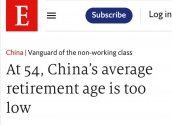Due to my rather limited knowledge about the operations of the big players in the Chinese software industry, I can only offer some generalized hypothesis and recommendations. I believe
@tphuang follows developments within Chinese industry much more carefully.
I think one reason stems from the fact that China is a relative newcomer to an industry where first-mover advantage is extremely difficult to challenge. If you look at the US market, most software services are dominated by 1-3 big players. Software industry is characterized by a high degree of economies of scale and iterative nature of product development, creating a high barrier of entry. On the B2C side, network effects for many types of platforms/products coupled with emphasis on design of features that promote user lock in within an ecosystem make it an uphill battle to claw users from established players. On B2B side, vendor lock in, cost of migration between different ecosystems, and ability to bundle together multiple offerings at discounted rates are obstacles for new entrants. To break into an established market, you either need to be able to offer a highly differentiated and specialized product with significant cost or feature advantage over existing products, or a completely brand new product for which there is no competition.
On the other hand, within China there already existed a massive and fast-growing domestic market for which Chinese firms had the ability to easily differentiate themselves from established foreign competition by tailoring their products/services to be better suited to local market conditions. For the past decade, it didn't make sense for Chinese firms to turn their sights overseas yet as the domestic market was rapidly growing and had massive potential. Without first capturing the domestic market, Chinese companies wouldn't be able to achieve the economies of scale and attain the resources needed to drive successful oversea expansion. However, as the Chinese market is becoming increasingly saturated, Chinese companies should begin shifting attention to overseas expansion.
Overall, I believe that the preconditions for Chinese companies to be able to succeed overseas in software services/platforms just did not exist until recent years. Software is a high level industry that depends on a certain level of overall level of industrial/economic development and excess wealth to be able to generate the profits necessary to fund R&D and expansion. There exists a certain other country with massive potential market and ability to generate the necessary economies of scale derived from its huge population that has chosen to focus heavily on the development of its software and IT services industry as a means of driving economic growth unsuccessfully for the past 2-3 decades. Trying to leapfrog past the industrialization stage of development by jumping straight to software just doesn't work.
In more recent years, we have begun to see the potential of Chinese software/IT companies in overseas market, ie Huawei and ByteDance. I believe the recognition of the threat of Chinese competition in a highly lucrative industry traditionally dominated by US companies that are responsible for a significant portion of wealth-generation in the US as one of the primary driving forces motivating the US policies regarding to the technology blockade and campaign to block off Chinese tech companies from US and US-influenced markets.
In the coming years, I hope to see Chinese companies establishing footholds in less developed and emerging markets with growth potential where US companies are not entrenched in. Chinese companies should also establish partnerships with companies in Russia and South Korea, which have been trying to establish their own players in the industry but lack the economies of scale on their own to do so, ie establishing joint ventures to develop platforms and/or licensing foundational software products.



